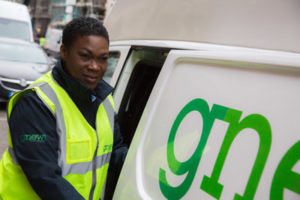UK Institute of Couriers (IOC) chair of electric vehicle group, Sam Clarke is looking at green beyond the power train. Gnewt Cargo is participating in a trial to investigate whether ‘parcel porters’ could help reduce CO2 emissions from delivery vans.
Research
Researchers from Lancaster University, together with The University of Westminster, the University of Southampton, and University College London are delivering a trial to investigate whether a workforce of ‘parcel porters’ could help to reduce the current demand for kerbside space by delivery vans.
Porters will meet with van drivers at the kerbside and receive pre-prepared bags of parcels to deliver to homes and offices on foot. This is expected to significantly reduce the time spent out on delivery, while reducing carbon emissions and local air pollution due to the decreased mileage driven per round per van. Also less space is necessary for unloading.
The project is backed by Transport for London (TfL) and the Engineering and Physical Sciences Research Council (EPSRC) through the Freight Traffic Control 2050 project, as well as Gnewt Cargo. To be carried out in central London over a four-month period, the trial is expected to fundamentally change parcel deliveries by combining the use of porters with electric delivery vans.
Reduce freight traffic with 10 per cent
Glynn Barton, Director of Network Management at Transport for London, said: “It’s fantastic to see this new trial into parcel porters, which could reduce the impact of freight movements in London and improve congestion and air quality. The Mayor’s new Transport Strategy aims to reduce freight traffic by 10 per cent by 2026 in central London and supporting the growth in sustainable deliveries will be key to achieving this”.
Dr Oliver Bates, Senior Research Associate at Lancaster University’s School of Computing and Communications, said: “We’re really pleased to be part of this innovative project. By integrating location and manifest data together in one place we’ve been able to show how important stopping locations and walking are to last mile logistics, and improve our understanding of the use of our city kerbsides”.
Growing e-commerce in B2C and B2B
One result of this rapid growth in UK e-commerce has been the increase in delivery vehicle activity needed to provide all these goods to residential and business customers with van journeys in the UK estimated to have resulted in 17.3 million tonnes of CO2, 63,000 tonnes of nitrogen oxides and 2,200 tonnes of particulate matter in 2014. The UK Department for Transport forecasts suggest van activity nationally will increase by about 60% by 2040 unless action is taken.
The team’s earlier research concluded that a typical parcel van delivers on average 126 parcels to 72 different establishments from 37 stopping places over a 7.3 hour round. During this time, the vehicle is parked at the kerbside for four and a half hours, approximately 60 per cent of the round, while the driver is out delivering parcels on foot, walking around 7.9km, with up to 25% of the consignees being above ground level in buildings.
First trial
In the first trial, a round of 190 parcels was organised with approximately half delivered by four porters while the driver made all of the collections and deliveries of large, heavy items or multiple items to the same address. The porters walked 5km to deliver their packages taking three hours and 40 minutes, each delivering two 140 litre bag loads, with a total round time reduction of 33 per cent.
Professor Tom Cherrett, from the University of Southampton and principal investigator, said: “What we are essentially talking about here is decoupling the driving and walking elements of the last-mile delivery to dramatically decrease the amount of van time spent stationary at the kerbside and the numbers of vehicles needed”.
Source: IOC

